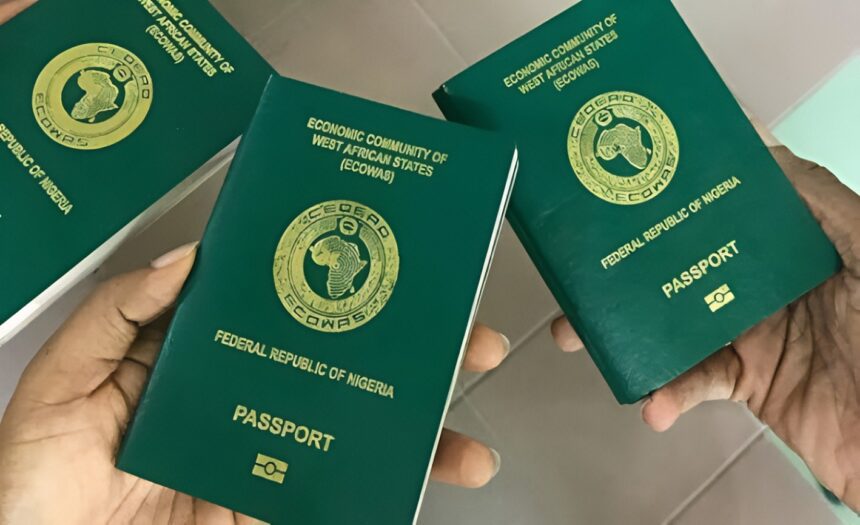Nigerians have begun to react to the Senate’s proposed 10-year passport ban for convicted citizens living abroad.
This comes after the Senate has advanced a bill proposing a 10-year passport ban on Nigerians convicted abroad.
The legislation, which passed its second reading on Tuesday, is said to be aimed at curbing the reputational damage inflicted by some citizens engaging in international crimes, but it has ignited fierce debates on social media and beyond, with many praising the bill while others question whether it amounts to double jeopardy for those who have already served their sentences.
Sponsored by Senator Abubakar Bello (APC, Niger North), the bill seeks to amend the Passport (Miscellaneous Provisions) Act, mandating the withdrawal of international passports for at least a decade after a convict completes their foreign sentence.
Bello, in the bill, argued that the measure is essential for restoring global trust in Nigeria’s travel documents, which have faced increasing scrutiny from countries like the United States, China, and the United Arab Emirates due to rising cases of fraud, drug trafficking, and human trafficking linked to Nigerians.
Leading the debate, Senator Mohammed Ogoshi Onawo (PDP, Nasarawa South) decried the “state of emergency” surrounding the green passport, once a symbol of national pride.
“Innocent and patriotic Nigerians suffer harassment at airports, visa denials, and constant suspicion simply because of the actions of a few,” he stated, emphasizing that the ban would act as a “strong deterrent” to those tarnishing the nation’s image.
The proposed 10-year passport ban comes amid heightened concerns over Nigeria’s diaspora challenges.
According to data from the United Nations and local NGOs, over 170,000 Nigerians are incarcerated abroad, predominantly for drug and fraud-related offenses, contributing to stringent visa regimes imposed on all Nigerian travelers.
Recent high-profile cases, include the sentencing of Oba Joseph Oloyede in the U.S. for a COVID-19 loan fraud scheme.
Speaking on the proposed 10-year passport ban, a lawyer based in Abuja and a human rights activist, Frank Tietie, said the bill is a good development.
Tietie also commended the Nigerian Senate for the bill, describing it as a needed step.
He stated: “We must first commend the initiative that the Nigerian people and Nigerian leaders have now come to a point where they have realized the embarrassment Nigerians have been causing to themselves, especially Nigerians abroad.
“We have a very bad reputation, sadly and shamefully caused by criminalities, by a few of us abroad. And it seems as if it’s intractable and nothing could or can be done about it.
“In this regard, to think that the members of the National Assembly are in the forefront of finding a solution to this makes it really very encouraging. It’s maybe very difficult, because we have systems here that hardly work within our control. And now to think that we have to collect information about convictions of Nigerians abroad will be very difficult. However, it’s a very welcome development.”
However, Tietie opined that the bill won’t improve Nigeria’s image overnight.
According to him, a lot still needed to be done to achieve the desired result.
He continued: “Let me be honest with you, it will not in any way improve the reputation of Nigeria as it stands today, as the capital of scammers and persons who export what we call 419, crimes that are advanced fee fraud crimes.
“However, it will be a first step that is so positive that it will give the impression that the Nigerian authorities are now taking the reputation of Nigeria, very seriously when it comes to the bad acts of many Nigerians abroad.
“We have to come back home to carry out another form of national orientation that deliberately presents Nigeria as a group of honest people you can trust where you can expect honest business, and if you ever encounter them abroad, you should know what to expect.
“That will take a long time. That will also take a lot of effort on the part of the Nigerian government and culturally speaking, on the part of Nigeria.
“It’s going to take a lot of time, and it’s going to take a lot in terms of resources, campaigning and presenting us with this new brand that we are no longer people that are oftentimes associated with criminality, especially advanced free fraud, scamming foreigners and getting involved in drugs, drug trafficking, human human trafficking, and all of that. It’s good but it will take a long time.”
Critics, however, decry the proposed 10-year passport ban as an unjust extension of punishment, raising alarms about double jeopardy and the right to redemption.
A public analyst, Ifeanyi Uddin in his reaction said: “Not too sure what to make of this. Convicted abroad, they have most likely served a punishment. Double jeopardy? Whatever it is, our sense of criminal justice seems to preclude the possibility of both repentance and renewal.”
Below are some other reactions;





